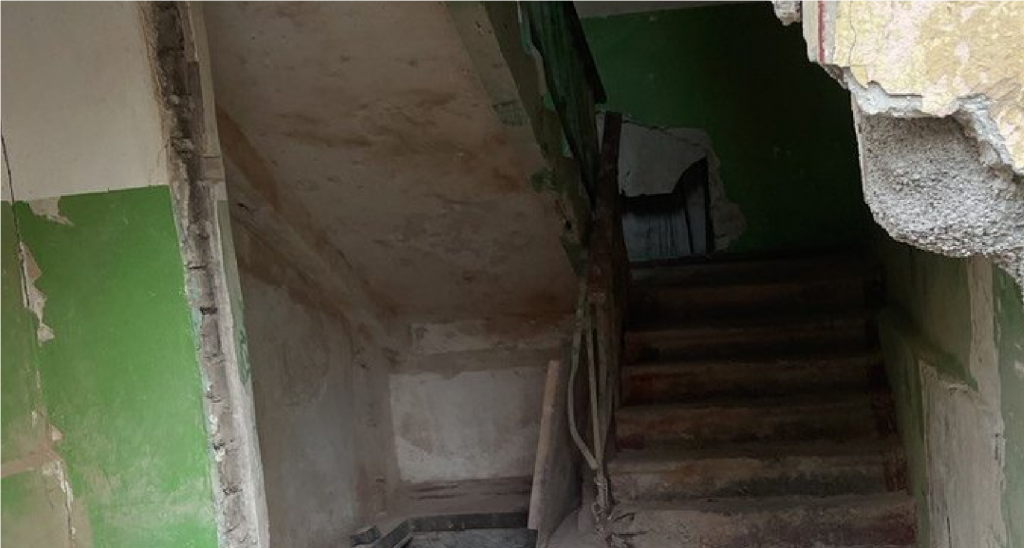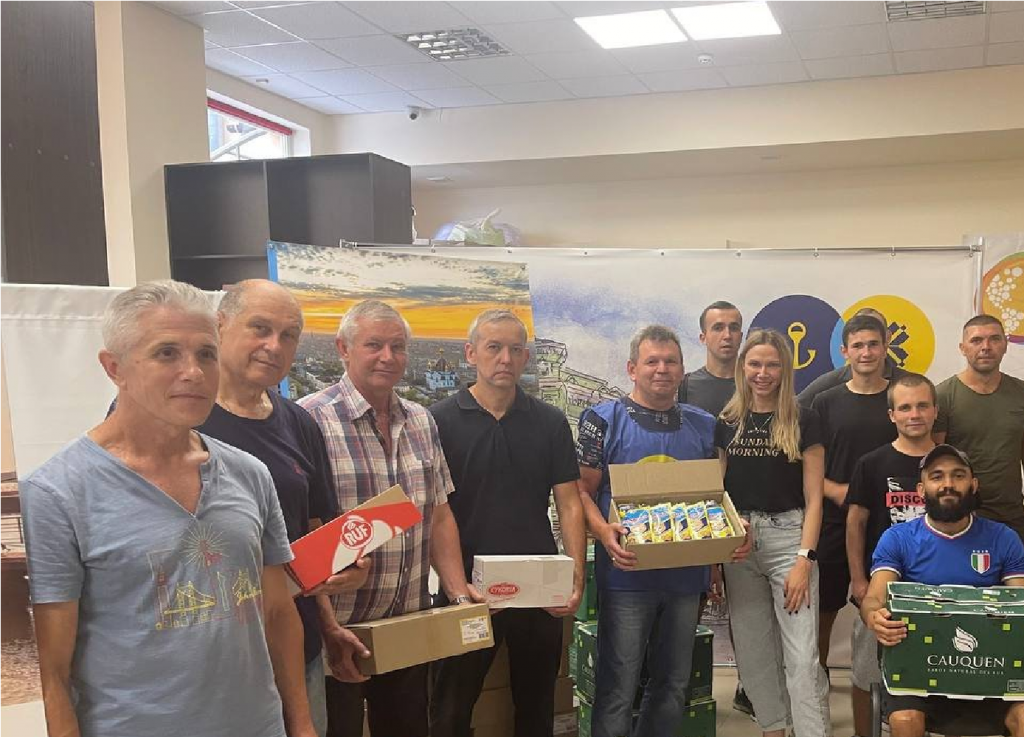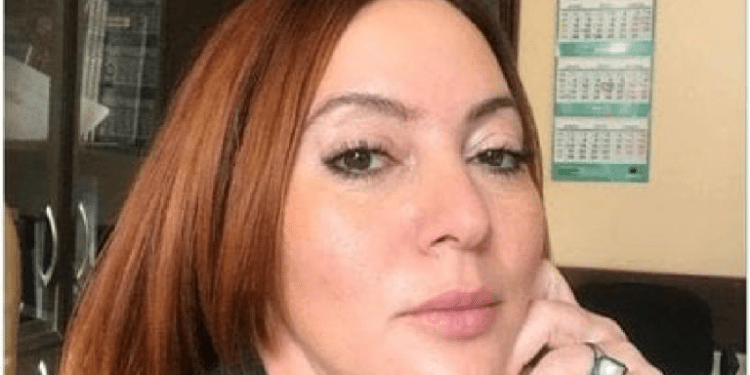For 23 days in the occupied city of Mariupol, journalist and chief editor of the newspaper “Priazovsky Rabochiy,” Olena Kalaitan, fled on foot with her son to escape the war’s shelling. Their home was destroyed, and the occupiers seized the newspaper’s office. Initially, they were evacuated to Zaporizhzhia and later to western Ukraine. Olena didn’t give up and, along with her team, started afresh: she restored the website’s operation and helps her fellow countrymen who temporarily settled in Ivano-Frankivsk.
Olena Kalaitan in her office at the “Priazovsky Rabochiy” newspaper’s editorial.
To lose everything and start a new life.
On February 24th, Olena Kalaitan, the director and chief editor of the oldest newspaper in Mariupol, “Priazovsky Rabochiy,” woke up at 5 AM. Her phone was flooded with messages, coming in almost every second, all carrying the same message – “Olena, the war has begun.”
— It was unexpected. It was shocking. But still, we didn’t think it would be a full-scale invasion. In 2014, when the city was briefly occupied, our forces liberated it in a few days, so we hoped it would be the same this time. However, on that very day, the first shelling started in the Eastern district. 23 people were injured, including a child, — Olena narrates.
Despite the terrifying news of the loss of innocent lives in Mariupol, Olena didn’t rush to leave the city. Moreover, despite the shelling, she and her colleagues continued to work, managing social media and updating the “Donbas 24” website.
— We had a prepared newspaper issue for February 25th, but the postal service said they wouldn’t be able to deliver it. So, we decided to focus on our website. We uploaded news, photos, and whatever we could until around March 5th. After that, the city lost all electricity, and with it, communication — the journalist continues.
With each passing day, the shelling was getting closer to the city center, leaving no possibility for Olena to evacuate. Like all residents of Mariupol, she and her son lived in a basement for almost a week. Olena had very little with her – a small “emergency suitcase” and a few drawings her son had made. On March 13th, her house was hit by shelling, and her car was crushed by debris. The chances of leaving seemed almost impossible. However, after four weeks of intense shelling in Mariupol, discussions about evacuation finally began. To get to the buses, Olena had to risk not only with her own life but also with her son’s fate.

— On March 18th, we heard that the buses for evacuation were waiting. Our neighbors tried to stop us from going out under the shelling, but we grabbed our suitcase and ran. When we saw around 200 people waiting for the buses, we decided to continue on our own. We reached the outskirts and started flagging down cars. It was a miracle: the third car stopped and took us to a Russian checkpoint, — says Olena.
There, Olena experienced another shock. Armed with guns, the Russian occupiers ordered her son to get out of the car.
— The occupiers tried to force everyone to go to Russia. They stripped my son and all the boys to the waist, searching for Azov tattoos and checking phones, but we managed to get through. That’s how we ended up in Zaporizhzhia,— the journalist continues her account.
“It wasn’t easy, but we did it!”
In Zaporizhzhia, Olena didn’t stay for long. At the end of March, she and her son moved to Ivano-Frankivsk. She managed to establish contact with her colleagues there, but they had to suspend the “Priazovsky Rabochiy” newspaper operations. However, the team quickly adapted, and in April, they resumed the work of the “Donbas 24” website, which was created shortly before the full-scale invasion.
— It was challenging because most of my colleagues couldn’t take their equipment with them, but we had to continue working. We had to buy things on credit, ask for help, and borrow, but we made it. Currently, journalists are working remotely, — Olena Kalaitan shares. Our website gathers a lot of useful information for displaced people and provides up-to-date news from the eastern regions.
The editorial equipment remained in the occupied territory, and they couldn’t retrieve anything. Fortunately, the editorial office building in Mariupol survived with minor damage to the roof, and now the occupiers are repairing it and attempting to restore the facilities. For Olena, who dedicated 30 years to journalism and in 2019 became the head of the Donetsk Regional Union of Journalists of the National Union of Journalists of Ukraine, talking about this is painful.
— I know that on May 9th, the occupiers prepared an issue of our newspaper. They completely stole our template and design, but they provided entirely different information than what was in the Ukrainian edition! What I feared the most was that they would exploit the trust of our readers. I wrote a letter to the National Union of Journalists of Ukraine (NUJU) stating that we had suspended the newspaper’s publication, and if it continues during the war, we are in no way involved, — the editor added.
“We have to help each other because the people of Mariupol are like one big family.”
In July, Olena took the lead at the “I am Mariupol” Information and Humanitarian Hub in Ivano-Frankivsk, where she now assists her fellow compatriots through words and actions.
— In the center, we offer various forms of help: humanitarian aid, legal consultations, psychological training, and organize numerous events. It’s a fantastic project because the people of Mariupol are working for the people of Mariupol. Some even come to us just to talk, to share their experiences. For me, this is very important, — confesses Olena.

Starting a new life a thousand kilometers away from her hometown, which was almost entirely destroyed by Russian invaders, was not easy. But today, Olena is filled with hope and faith in the future. Above all, she dreams of returning to Mariupol.
— The war has shown that it can take away our homes but not our experience. I believe we will soon return home and rebuild our long-suffering city. We will make it even better than it was before. Victory will surely be ours! — asserts the determined journalist.
Today, Olena Kalaitan is involved in the communication efforts of the “I am Mariupol” aid project. She is preparing to launch a new newspaper that will be distributed in 17 centers providing assistance to refugees from the city of Mariupol.
Olena sees her mission in helping her hometown, which was devastated by the Russians, and she eagerly awaits justice for those responsible for this destruction.
Olena’s resilience and determination exemplify the spirit of many Ukrainians who have faced the devastating consequences of war but remain hopeful for a brighter future and determined to rebuild their communities.
The situation highlights the ethical concerns journalists face during times of conflict, where information can be manipulated to mislead and deceive readers. Olena’s actions reflect her commitment to maintaining journalistic integrity and protecting the publication’s credibility she has dedicated her life.
This series, titled Executed Free Speech, is created as part of a project Drawing Ukrainian And International Audience’s Attention To Serious Violations Of Human Rights And Crimes Against Journalists And Mass Media By The Russian Federation, which is performed by the National Union of Journalists of Ukraine, with support from the Swedish non-profit organization Civil Rights Defenders.
JOURNALISTS ARE IMPORTANT. Stories of Life and Work in Conditions of War is a cycle of materials prepared by the team of the NUJU with the support of the Swedish human rights organization Civil Rights Defenders.
#CRD

 THE NATIONAL UNION OF
JOURNALISTS OF UKRAINE
THE NATIONAL UNION OF
JOURNALISTS OF UKRAINE
















Discussion about this post